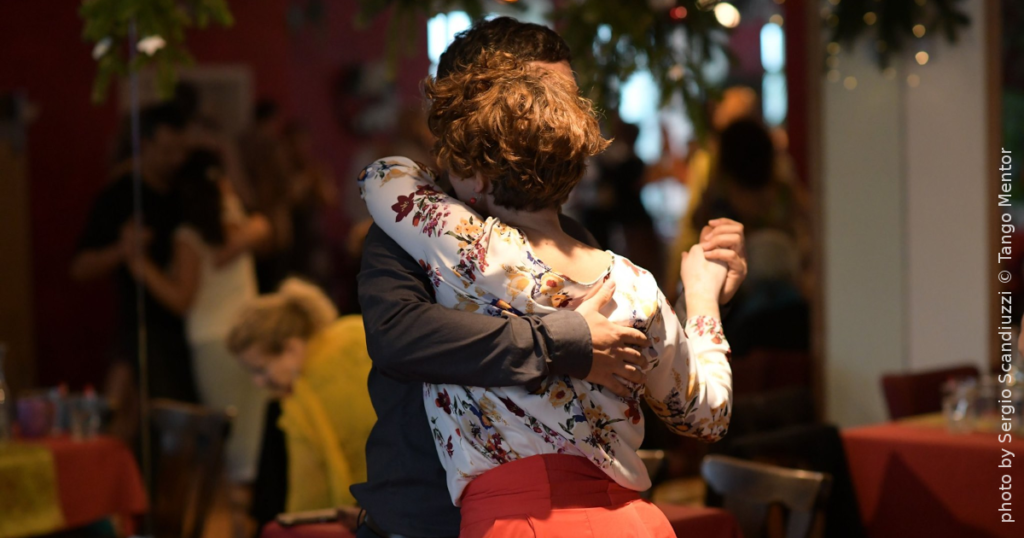
When your desire to show off and grab attention overtakes the need to connect with your partner, your dancing loses something. The tango experience is a delicate structure, and even the smallest change can alter everything.
I’ve been contemplating writing about the concept of the dying angel for quite some time, but it has always eluded me. I struggled to find the right words to describe it… Perhaps I needed time to bring it closer and gain clarity in my mind.
Dance like no one’s watching!
“When you perform, your tango angel dies” is a saying that was uttered by some of the old milongueros. I can’t recall where exactly I first encountered it, but I do remember it remained a puzzle that I couldn’t solve for a long time. What does it mean? How can a simple act of performing influence your dancing? Although I couldn’t fully grasp its true meaning, instinctively I sensed its profound wisdom.
The simple explanation is that when you dance solely for the onlookers in the milonga, your authenticity is compromised. Your dancing changes as you crave external validation. You forget about your partner, and the dance loses its soul. However, let’s delve into the subtleties and more obvious effects of performing.
1. Your repertoire changes
You cease to be yourself and express what’s inside you, instead “fishing” for attention. Every gaze from those who watch you steals a part of your soul. Showing off causes you to abandon your authentic story and employ movements to attract attention. Unaware of the process, you start forsaking your regular repertoire and reaching for more complex sequences stored on the upper shelves of your dance vocabulary.
2. You forget your partner
Your partner becomes a mere extension of your ego. You begin to see them as a limitation, particularly if their dancing level is lower than yours. They transform into a tool to enhance your own performance, no longer seen as a person or companion with whom you share emotions. The connection exists solely to execute steps and is no longer considered a goal in itself. If this is the case, one might question why it should even be considered tango, as dancing alone would yield the same result, albeit devoid of true partnership.
What many dancers are not aware of is that what they imagine is often far from what they are able to execute, resulting in them becoming a caricature of their own vision.
Hey, sorry to interrupt…
Do you like reading my articles? If you do please consider a small contribution to the existence of this blog.
I don’t sell a book or run ads: I share these articles for free. Unfortunately I also have to pay my bills, so if you see value in my work please consider a small donation/gratuity (the same way you tip your favorite bartender).
From my heart to yours!
Ivica
Securely processed via PayPal
3. You start listening to the music in a different way
It is no surprise that some dancers find subtle and intricate music boring. Have you noticed how some prefer to dance to music with explosive, exaggerated beats? When showmanship becomes the primary objective, you search for the “bang!” – the dramatic and hyperbolized elements that allow for extravagant moves. Drama and spectacle, often accompanied by overpowering singing, become the driving forces behind your dance style.
4. You disrespect the ronda
Social tango entails visiting the milonga and dancing on a crowded floor alongside your friends. It also means respecting them and their desire to have a good time dancing beside you. When showing off becomes your goal, the ronda and other couples suddenly become a nuisance. They bother you and limit your ability to create the grand spectacle you envision. Your ego distorts your perception of the ronda, rendering dancing in harmony within a confined space an inconvenience. The onlookers erase your ability to connect with other couples on the dance floor, and you forget the importance of collective enjoyment and solidarity.
I often advise my students to avoid watching YouTube videos of show dancing and idolizing performers. It’s a trap! Even if you’re aware that it’s merely a show and not meant to be replicated at milongas, it changes you. Because, as the saying goes, “Monkey see, monkey do!”
Not that I’m not guilty of killing my own tango angel countless times. When I step onto the dance floor, I often remind myself to forget about the people sitting around and watching me dance, and instead, focus on my partner and our joint flight to the tango clouds.

Leave a Reply